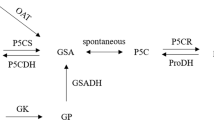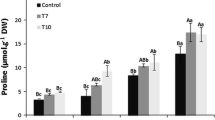Abstract
Soil salinity is an important determinant of plant growth and survival. In legumes, saline conditions impose a significant limitation of productivity related to the combined effects on the host growth and the root nodulation by Rhizobia. Salt stress conditions initiate various biochemical and physiological changes in plants including a dramatic increase in intracellular concentration of proline. Proline is synthesized from glutamate via two successive reductions. In Vigna aconitifolia and Arabidopsis thaliana the reduction of glutamate to its semialdehyde intermediate was demonstrated to be catalyzed by a single bifunctional enzyme Δ1-pyrroline-5-carboxylate synthase (P5CS). To isolate alfalfa-P5CS, a cDNA library prepared from salt stressed alfalfa (Medicago sativa L.) roots was screened using Arabidopsis P5CS cDNA clone as a probe. Two clones were identified, MsP5CS-1 (2.6Kb) and MsP5CS-2 (1.25Kb), with homology of only 74% in the nucleotide sequence and 75% in the deduced amino acid sequence. MsP5CS-1 and MsP5CS-2 show 82% and 75% homology to Vigna cDNA, respectively. Both show 72% homology to the Arabidopsis cDNA clone. Southern blot analysis revealed the presence of two different genes. The transcription pattern of the two genes in alfalfa roots was studied in 6 d-old hydroponi- cally grown seedlings that were exposed to 100mM NaCl for 72 hours, and compared to control seedlings. Roots samples were taken periodically, total RNA was extracted and the level of the transcripts was estimated by RT-PCR with primers specific to each gene. The results show an increase in the transcriptional level of the two genes, characterized by two dominant peaks at 6 and 48 hours. The induction of MsP5CS-2 transcription was higher than that of MSP5CS-1 It is suggested that the primary increase induced by the salt stress is feed-back inhibited by the accumulating proline. The second induction might be due to adaptive process caused by a long exposure to NaCl.
Access this chapter
Tax calculation will be finalised at checkout
Purchases are for personal use only
Similar content being viewed by others
Author information
Authors and Affiliations
Editor information
Editors and Affiliations
Rights and permissions
Copyright information
© 1997 Springer Science+Business Media New York
About this chapter
Cite this chapter
Ginzberg, I., Kapulnik, Y., Zilberstein, A. (1997). Transcription of Δ1-Pyrroline-5-Carboxylate Synthase in Alfalfa Roots During Salt Stress. In: Altman, A., Waisel, Y. (eds) Biology of Root Formation and Development. Basic Life Sciences, vol 65. Springer, Boston, MA. https://doi.org/10.1007/978-1-4615-5403-5_59
Download citation
DOI: https://doi.org/10.1007/978-1-4615-5403-5_59
Publisher Name: Springer, Boston, MA
Print ISBN: 978-1-4613-7467-1
Online ISBN: 978-1-4615-5403-5
eBook Packages: Springer Book Archive




